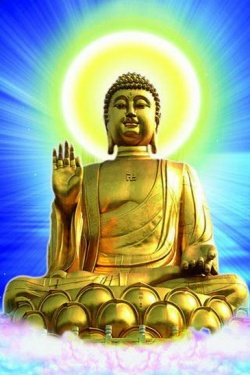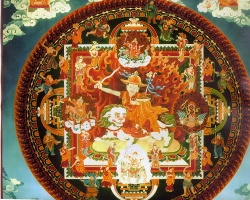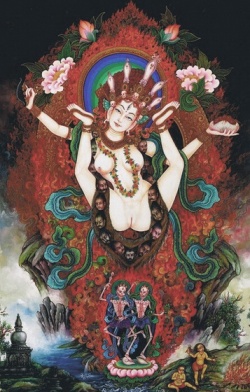The Benefactor’s Garden
<poem> In the Jeta Grove, in the Garden of the Benefactor of Orphans and the Solitary… Anathapindada, whose name means “benefactor of orphans and the solitary,”19 was a wealthy elder who lived in the city of Sravasti. He was also known as Sudatta, which means “joyous giving.”20 He was a rich man, but he didn’t understand the Buddhadharma. In fact, he had never even heard the Buddha’s name. One day, while arranging for his son’s marriage, he visited a friend, the wealthy elder Shan T’an No. That night Shan T’an No rose and began to decorate his house. Sudatta asked, “You’re adorning the house so beautifully, is there to be a celebration? Is your son going to be married?”
“No,” said Shan T’an No. “I have invited the Buddha to receive offerings.” When Sudatta heard the word “Buddha,” every hair on his body stood straight up on end. “Who is the Buddha?” he gasped. “The Buddha is the Crown Prince, son of King Suddhodana. He would have been the king, but he left home to cultivate the Way and became a Buddha instead. I have invited him here to receive offerings.”
Having heard the word “Buddha,” Sudatta couldn’t get back to sleep. Shakyamuni Buddha knew that Sudatta’s heart was sincere and he emitted a light which shone so brightly that Sudatta thought it was dawn, got out of bed, and went out of the city. The city gate was locked, but the Buddha opened it with his spiritual powers and Sudatta proceeded to the Buddha’s dwelling in the Bamboo Grove.
Just as Sudatta arrived, four gods descended, circumambulated the Buddha three times, and then bowed in order to show Sudatta the proper gestures of respect. Because Sudatta had never seen the Buddha or heard the Dharma, he followed the gods’ example and the Buddha explained the Dharma to him. Sudatta was delighted and said, “Buddha, you have so many followers, you really need a big place to live. I shall prepare one and invite you to live there.” “Fine,” said the Buddha. Sudatta looked, but he couldn’t find the right land. Finally, he saw Prince Jeta’s garden. It was big enough, but Prince Jeta refused to sell. “If you want to buy my garden,” he laughed, “first cover it with gold coins. That’s my price.”
Sudatta didn’t stay to bargain with him, he just said “Okay,” and moved his treasury, piece by piece, to the garden and covered the entire grove. “Now your garden belongs to me,” he said to Prince Jeta.
“I was only joking,” said the Prince, annoyed. “I’m keeping it for myself. How could I sell it to you?” “You told me that you would sell if I covered it with gold, and I took you at your word,” Sudatta said. “If you plan to be a king, you really shouldn’t joke with people. A king’s word must stand.” “Very well,” said the Prince, “you covered the ground with gold, so the park is yours. But you didn’t cover the trees. The trees are mine!
But I’ll give them as a donation…” Because the trees belonged to Prince Jeta, it is called the Jeta Grove, and because the garden was Sudatta’s, it’s called the Garden of the Benefactor of Orphans and the Solitary. In China, when Keng Wen established the nation, he assisted four kinds of poor people: widows, widowers, orphans, and the childless, or solitary. Sudatta also gave aid to these four kinds of people, and so he is known as the Benefactor of Orphans and the Solitary, that is, Anathapindada.
Together with a gathering of great Bhikshus, twelve hundred and fifty in all… This phrase fulfills the audience requirement. Together means that they studied under the same teacher, lived in the same place, and investigated the Buddhadharma together. They all had the same Bodhi mind and had opened the same wisdom, attained the same result, and would together realize Buddhahood.
Because they had so much in common, the text reads, together. The Sutra text first lists the assembly of Sound Hearers because they are sages who have transcended the world. The Bodhisattvas are listed next because they are sometimes Bhikshus and sometimes laymen. They cultivate the Middle Way and so they are listed in the middle. The gods and dragons of the eight-fold division are listed last because they are in the world and represent the common people. Sometimes the Bodhisattvas are present in the Dharma assembly, and sometimes they travel to other worlds. The Bhikshus, on the other hand, were the Buddha’s constant followers. They always listened to the Sutras and the Dharma, and so they are listed first.
Great has three meanings: 1) great, 2) many, and 3) victorious. Bhikshus are respected by kings and “great” men and so they are “great.” They have cut off afflictions and destroyed the “many” evils. They are different from, and “victorious” over all external religions.
Bhikshu also has three meanings:
1) seeker of almsfood, 2) one who frightens Mara, and 3) destroyer of evil.
When one ascends the precept platform to be ordained, one’s request for ordination may be granted after three appeals. An earthbound yakËa ghost informs a space-travelling yakËa, who flies up to inform the heavenly demons. The heavenly demons are terrified and tell Mara, the king of the sixth desire heaven, “The Buddha’s retinue has increased by one and ours has decreased by one!” At this, Mara’s palace quakes. Thus a Bhikshu is one who frightens Mara.
He also destroys the evils of the eighty-four thousand afflictions because he has resolved his mind on Bodhi.
The Six Harmonious Unities of the Sangha These Bhikshus were assembled together as a Sangha. Sangha is a Sanskrit word which means “harmoniously united assembly.”21 They live together without bickering or fighting and are united in terms of phenomena and noumena. In terms of the noumenal aspect, they have given proof to liberation and to the unconditioned. In terms of the phenomenal, they are united in six ways:
1) As a harmonious group, they dwell together. They don’t look at one another’s faults and fight among themselves. No one has a special style. There are, for example, no solitary drinkers or smokers out of harmony with the rest. Everyone who lives with the Sangha must abide by the Sangha’s rules.
2) With harmonious speech, they do not quarrel. They don’t gossip. They don’t say, “So and so has such and such an asset, and so and so has such and such a fault…three frogs have six eyes.” Their speech is harmonious and what they talk about is important and has principle. They don’t argue.
3) With harmonious thoughts, they enjoy the same things. One person likes to study the Buddhadharma and so does the next. One is vigorous and the next is even more so. The more one person cultivates, the more the next cultivates. Everyone makes vigorous progress. Every day they are more energetic, not more lazy. Cultivating more and speaking less, their minds are in harmony.
4) With harmonious views, they have the same liberation. 5) With the same precepts, they cultivate together. 6) In harmony, they mutually share their benefits. …Twelve hundred fifty in all… These were the Buddha’s constant followers, his retainers. When the Buddha went to lecture Sutras, these Arhats always went along, even if they had already heard the Sutra.
There were actually twelve hundred fifty-five disciples, but for the sake of convenience the number was rounded off to twelve hundred fifty. Where did the disciples come from? In the Deer Park, the Buddha first taught the five Bhikshus. Then YaÇas, the son of an Elder, and his forty-nine disciples took refuge. The Venerable Shariputra and the Venerable Mahamaudgalyayana each had a hundred disciples who took refuge. That makes two hundred fifty-five. The Kasyapa Brothers had a thousand disciples, making twelve hundred fifty-five, and, rounded off, twelve hundred fifty in all. <poem> www.quantumbuddhism.org


